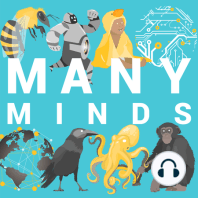13 min listen
Cities, cells, and the neuroscience of navigation
FromMany Minds
ratings:
Length:
78 minutes
Released:
Sep 21, 2022
Format:
Podcast episode
Description
If your podcast listening habits are anything like mine, you might be out for a walk right now. Maybe you’re wandering the neighborhood, just blocks from home, or maybe you’re further afield. In either case, I’m guessing you’re finding your way without too much trouble—you’re letting some intuitive sense steer you, track how far you’ve gone, tell you where to go next. This inner navigator of yours is doing all in the background, as your mind wanders elsewhere, and magically it gets it all right. Most of the time, anyway. But how is it doing it? What allows us to pull this off? My guest today is Dr. Hugo Spiers, Professor of Cognitive Neuroscience at University College London. His lab studies how our brains "remember the past, navigate the present, and imagine the future.” In recent years Hugo and his group have used a wide variety of methods—and some astonishingly large datasets—to shed light on central questions about human spatial abilities. Here, Hugo and I do a quick tour of the neuroscience of navigation—including the main brain structures involved and how they were discovered. We talk about research on a very peculiar population, the London taxi driver. We discuss the game Sea Hero Quest and what it's teaching us about navigation abilities around the world. We also touch on what GPS might be doing to us; whether the hippocampus actually resembles a seahorse; the ingenious layout of our brain's inner grids; navigation ability as an early sign of Alzheimer's; how “place cells” actually map more than just place; and how the monarch butterfly finds its way. Super excited to share this one folks—this is an episode that's been on our wish list for some time. For mobile organisms like us, navigation is life or death—it’s as basic as eating or breathing. So when we dig into the foundations of these spatial abilities, we’re really digging into some of the most basic foundations of mind. So let’s get to it. On to my conversation with Dr. Hugo Spiers. Enjoy! A transcript of this episode is available here. Notes and links 4:00 – A brief documentary about a person with developmental topographical disorder. 8:00 – There have been a slew of popular articles about the question of whether GPS is undermining our navigation abilities—see here and here. 12:00 – A classic academic article about path integration in mammals. 14:00 – The classic academic article by Edward Tolman on the idea of “cognitive maps.” 16:00 – A side-by-side comparison of a human hippocampus and seahorse. The resemblance is indeed striking. 18:00 – A classic academic article reporting “place cells” in rats. 21:00 – A research article on seasonal changes in hippocampus size across different species. 22:00 – A recent academic article on interactions between the hippocampus and the striatum in navigation. 23:30 – An article reviewing the first decade of research on “grid cells.” A video showing the activity of grid cells in a rat. 26:00 – The long struggle to calculate longitude is subject of a much-beloved book by Dava Sobel. 27:00 – The press release announcing the Nobel prize for the discovery of grid cells and place cells. 31:00 – A popular article about ‘The Knowledge’—a famed test for London taxi drivers. 33:30 – The celebrated original study by Eleanor Maquire and colleagues on structural changes in the brains of London taxi drivers. The (also-celebrated) follow-up study that Dr. Spiers was part of, comparing London taxi and bus drivers. 37:00 – More about the Taxi Brains project can be found here. 41:00 – A recent paper by Dr. Spiers’ team, led by Eva-Maria Griesbauer, reviews the cognitive neuroscience studies on London taxi drivers and dives deep into the learning techniques the drivers use. 44:30 – A paper by Dr. Spiers and team providing an overview of Sea Hero Quest and the studies it has been used for to date. A video demo of the game, and a popular article describing its motivation. Dr. Spiers developed the idea for the game in collaborat
Released:
Sep 21, 2022
Format:
Podcast episode
Titles in the series (100)
The puzzle of piloerection: Welcome back folks! We’ve got an audio essay for you this week. It touches on art, music, the skin, the spine, individual differences, vestigial responses, tiny muscles. There’s even some Darwin thrown in there. It’s a fun one. Hope you enjoy... by Many Minds
